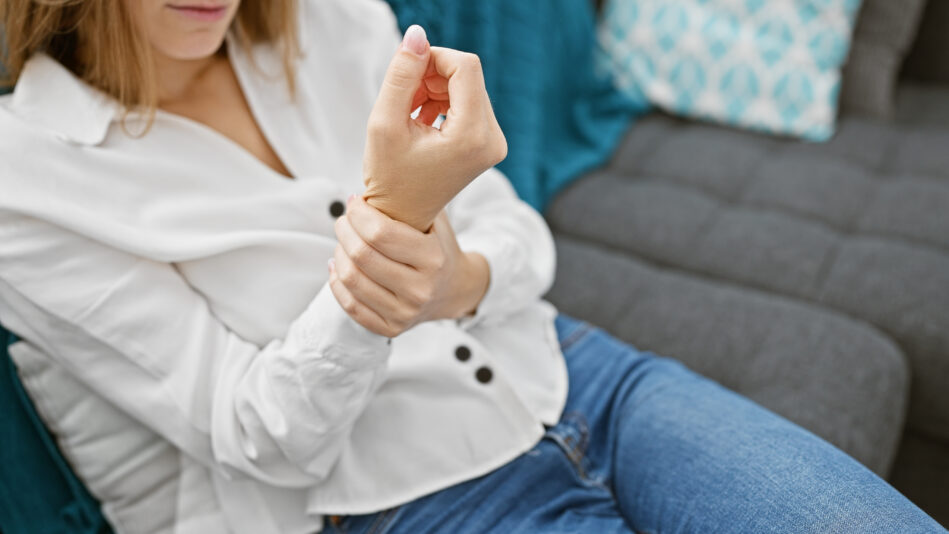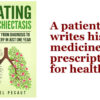Pain is a common symptom arthritis, and we have a culture that promotes medicine for pain — but we can do much better. Here are steps for easing pain while avoiding pills.
Pain is a common symptom associated with rheumatoid arthritis (RA) and osteoarthritis (OA). We have a culture that promotes pills for pain — but we can do much better. Pain medications are “chemical band-aids” that should never be the first line of treatment. We should instead be investing our time and energy in non-pharmacological alternatives that not only treat pain more effectively, but spare the potential for serious side effects.
The 5-point plan below offers pain relief and increased function as well as better health and well-being for the arthritis patient.
1. Fight Pain with Food
Inflammation is what causes the muscle pain from arthritis. What you eat makes a big difference! The best choice to limit inflammation and the pain it causes is a whole-food, plant-based diet consisting of vegetables, fruits, nuts, berries and whole grains. If you want to include animal products in your diet, keep them to a minimum and be mindful of the quality. Avoid processed foods and those with added sugar.
This diet will not only support a healthy gut microbiome to reduce pain and inflammation and boost your immune system, but will support a healthy body weight to maintain joint health. (Extra weight means extra pressure on your joints.)
2. Push Yourself to Exercise
When we have pain, the last thing we feel like doing is exercising! Yet exercise is critical for the arthritis patient as it increases musculoskeletal strength and flexibility as well as reducing joint pain. Strong muscles that support already vulnerable joints reduce the torque and stress at the joint lines. Non-weight-bearing exercise such as isometrics, biking and swimming can be especially effective. Remember to stay hydrated and use heat before exercise (warm up) and ice after (cool down) as needed.
3. Mindfulness Meditation
Mindfulness meditation can be a valuable tool in the management of arthritis pain. Remarkably, after only 4 days of mindfulness meditation training, pain unpleasantness and intensity were reduced by 57% and 40% respectively, according to one study. My patients’ favorite meditation apps are Calm and Headspace. Deep breathing exercises can also help manage pain –- inhale for 4 counts, hold for 4 counts, exhale for 4 counts. These techniques are quite effective in reframing the pain from something to fight into something to acknowledge and accept (in small amounts).
4. Osteopathic Manipulation
Osteopathic manipulation is a manual therapy that can often provide immediate pain relief. These gentle, hands-on techniques involve stretching, mobilization and traction, which improves circulation and joint function as well as reducing muscle spasm, pain and swelling, without side effects. Osteopathic manipulation assists the body in healing itself on a cellular level to optimize function.
Find this type of care by seeking out a DO (Doctor of Osteopathy) near you. DOs have the same level of training that MDs do, with the same ability to write prescriptions. But don’t expect your DO to encourage medical intervention. Philosophically, DOs focus on whole-person care -— rather than treat the symptom, the DO will more likely encourage you to make lifestyle changes to eliminate the cause of the problem. Most, but not all, insurance programs will pay for osteopathic care.
5. Sleep – Rest and Repair:
Pain can be exhausting during the day and may keep you up at night. Sleep is when the body repairs and rebalances. Sleep deprivation decreases our threshold for pain and impairs healing. We should aim for 7 to 9 hours of sleep nightly.
To support your sleep success, have a regular bedtime, limit or refrain from alcohol use, shut off all devices with screens at least 1 hour before bedtime and keep the bedroom dark and cool. Valerian herbal tea is a safe and helpful sleep aid.
We all want to feel and function optimally, and we all have important choices in our healthcare. The best choices offer high rewards and low risks. The lifestyle modification program outlined above can safely reduce the pain of RA and OA along with improving health and well-being without side effects. The choice is yours!






